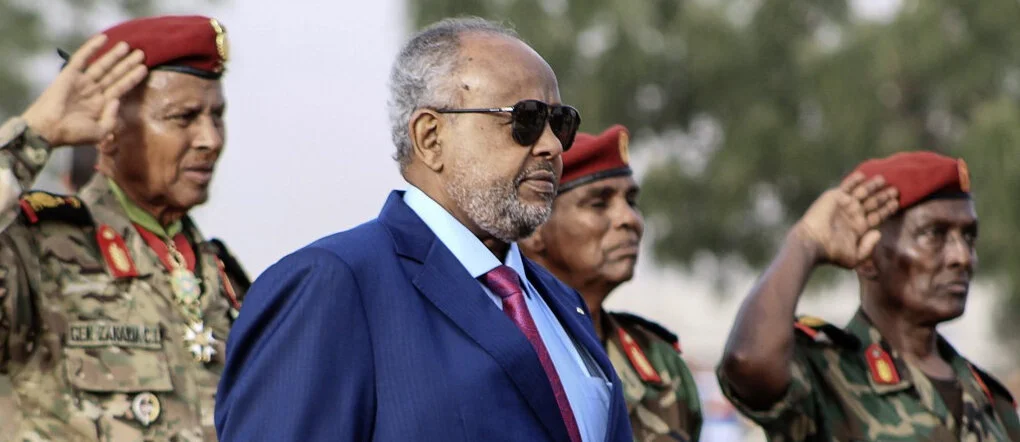In Djibouti, A Dictator Clings to Power and Extends Suffering
Ismail Omar Guelleh, nicknamed IOG, is well-known to Djiboutians. He has, after all, been in power since May 1999, the year he succeeded his uncle, Hassan Gouled Aptidon, for whom he was in charge of national security and intelligence gathering.
Just this month, on 9 April, Guelleh extended his 22-year reign by literally re-electing himself for a fifth consecutive term. In this election-like event – for it cannot be reasonably referred to as an “election” – Guelleh had no opponent other than a family relative who was introduced only to give the impression that there was a real competition underway. His name is Zakaria Ismail Farah, and he was a mere fig leaf on an otherwise farcical exercise. Guelleh and his allies at the Djiboutian electoral commission claim he won with over 97% of the vote. Guelleh is indeed a near-unbelievable one-man show.
For Djiboutian citizens – except the privileged few who are close to the regime – Guelleh’s name is synonymous with dictatorship and lost opportunities. Under his regime, human rights and civil liberties are routinely violated.
Reporters Without Borders, for example, ranks Djibouti 176 out of 180 countries in its most recent press freedom index. The country consistently registers as Not Free, according to Freedom House, writing that the Guelleh regime “uses authoritarian means to maintain its dominant position.” Related to this authoritarian mode of governance, poverty has also increased, rising from 41% in 1996 to nearly 80% in 2012 (the most recent figures available). Unemployment, too, has become massive, with more than 60% of citizens aged 15-34 being jobless. Our country’s health system has also been devastated. The quality of care is so poor that death is now at every corner, aided by rampant malnutrition, poor urban sanitation and related diseases like malaria, cholera-like diarrhea, and chikungunya fever. That Djibouti is near the very bottom of the annual United Nations Human Development Index, ranking 166 out of 189, is a rather predictable tragedy,
One might assume, then, that Djibouti lacks the sufficient resources to meet the needs of its nearly one million inhabitants. This is not the case. A report by the International Federation of Human Rights captured this reality perfectly: ‘’Djibouti is a rich country but the Djiboutians are poor.”
In fact, Djibouti generates huge amounts of income from its strategic port locations alone, especially since the country became the main Ethiopian corridor following the war that broke out in 1998 between Ethiopia and neighboring Eritrea. Djibouti is also home to an increasing number of foreign military bases that pay rents and contribute through their soldiers’ expenses to the local economy. Today, there are five major bases in the country, including from world powers: the US, France, Japan, Italy and China, among them. The estimated total rent from these military bases alone is around $128 million, which represents a significant part of Djibouti’s annual state budget.
The problem in Djibouti is not a lack of national resources or human potential. No, the problem in Djibouti is our dictator and chief predator: Ismail Omar Guelleh, who has become one the richest presidents in all of Africa. Guelleh, our homegrown kleptocrat, decided to monopolize state resources and the economy for himself, while condemning most Djiboutians to a life of extreme poverty and hopelessness.
This fact has long been known to the Djiboutians, but also to foreign observers and diplomats. Back in January 2004, for instance, a message sent to Washington from the American Embassy in Djibouti was clear: ‘’Djibouti is less a country than a commercial state-city controlled by one man, Ismail Omar Guelleh.” Nearly two decades later in her book –Djibouti: une diplomatie de géant d’un petit État – researcher Sonia Le Gouriellec observed: ‘’In Djibouti, the feathers of neo-patrimonialism manifest themselves through the strong personalization of Big Man power, based on bureaucratic structures.”
But while a growing number of diplomats and researchers from western democracies point out Guelleh’s corruption and human rights abuses, their governments have done little to push Guelleh towards reform. In February 2021, a few weeks before the sham presidential election, for example, Guelleh made an official visit to France during which President Emmanuel Macron welcomed him with open arms and a smiling face.
On 30 March, during the launch event of the annual Country Reports on Human Rights Practices at the U.S. State Department in Washington, DC, Secretary of State Antony Blinken said: "The Biden-Harris administration will stand against human rights abuses wherever they occur, regardless of whether the perpetrators are adversaries or partners.”
Guelleh, who clearly has plans to be president for life, will not be swayed by lofty rhetoric. He has heard it all before. What the U.S. Government can do, immediately, is to call out the recent sham election – and in so doing, stand by the Djiboutian people who aspire, just like Americans, to democratic change and free and fair elections. The U.S. Government can also take a firm stand by demanding the long overdue implementation of an agreement signed between Guelleh and the political opposition in December 2014, which would pave the way for fair elections through the creation of a Joint Independent National Electoral Commission.
The situation in Djibouti is an emergency. Words must be turned to action, by Djiboutians themselves but also by our development partners and friends abroad. This certainly includes Washington.
Dr. Daher Ahmed Farah is a published author, novelist and leading Djiboutian politician. He is the elected head of the Movement for Democratic Renewal and Development (MRD), Djibouti’s main pro-democracy opposition party. Dr. Farah currently lives in exile in Belgium due to persistent arrests and threats against his personal safety by Djiboutian authorities.
DISCLAIMER: The views expressed in this publication do not necessarily reflect the views of Vanguard Africa or the Vanguard Africa Foundation.

